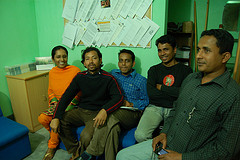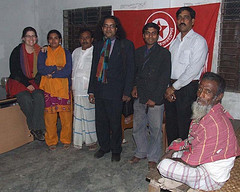We spent 3 weeks in Bangladesh, talking to a wide range of people about climate change, development issues, social change, and art. We're working on compiling our notes, trying to untangle all the threads. In the meantime, we wanted to share snippets from two of our most compelling interviews, excerpted from almost twenty hours of adda (conversation) with these two groups.

Nurul Alam Masud, PRAN
(Nurul Masud is the CEO of PRAN (Participatory Research and Action Network), a research and activist group based in Maijdee, Noakhali. They work on a variety of issues, including climate justice, ICT4D, and development issues. PRAN has conducted dozens of community climate justice hearings, and helped organize the national youth climate camp, where participants wrote the Bangladesh Youth Declaration on Climate 2009. We've been corresponding with PRAN since the leadup to COP15, when they contacted MCJ.)
Q: What does climate justice mean to you?
First, rich countries need to step up with carbon finance. When someone's injured in a car accident, we naturally expect the responsible party to pay. As climate change occurs, the third world suffers the most, and it's vital that the biggest carbon emitters pay the costs.
Global emissions need to be halved by 2015. The lives of Americans impact ours as well. A single American's daily commute might generate more CO2 than a single rural Bangladeshi might generate in an entire year. A Nijhum Dweep resident grows his or her own food, buys a little kerosene, has no access to electricity, plants trees. The top and bottom carbon footprints need to come closer together.
Q: What kinds of climate impacts have citizens been reporting at your public climate hearings?
We see four vulnerable groups: fisherfolk, marginal farmers, island dwellers, and landless people. Let's take local fishing communities for example. The weather warning signal went off 168 times in 2009. Fishermen go to sea for up to 15 days at a time. They have to take huge loans to do business; interests rates can be 30% annually, and fishermen are forced to sell their catch back to the loan broker. Every major weather warning signal causes a financial loss for fishermen forced back to shore, driving some out of their jobs. Fishermen have been reporting a rise in water temperatures. When the temperature rises, fish populations move, forcing fishermen to move with them. Climate change has been changing the breeding schedules of fish like hilsa [the national fish, culturally important].
Q: How can international climate justice movements support your work?
It's critical for us to network. All our causes need to be connected. For example there are deep linkages between the situation in Noakhali and in the Amazon. Now that we have a global governance framework, we can lobby jointly on our issues. The governance system doesn't respect the impacted, and those impacts are only growing.
It's important for us to be able to get our message and collected data out to a wider audience. That works both ways. When Noakhali residents can refer to work being done by allied activists in places like Seattle, powerful forces in our community pay attention, realizing that we're better-connected than they'd anticipated.
We need to change the nature of our movements, find innovative ways to non-violently build power for the impacted. Moving ahead will mean working in four areas: networking, knowledge sharing, collective action through groups like 350, and developing better evidence.

Badrul Alam, Bangladesh Krishok Federation
Badrul Alam is the president of the Bangladesh Krishok Federation (BKF), a nationwide rural peasant movement affiliated with La Via Campesina. They work with the EquityBD climate justice working group, and recently ran dozens of climate workshops in communities around the country. Raj Patel put us in touch with BKF.
Q: How did BKF start getting involved with climate issues?
Our members have been seeing the evidence in their own communities: an increase in flash floods, cyclones, desertification. We started working seriously on this issue since 2006. BKF has been working with La Via Campesina and other international groups on this issue. We saw the perpetrators of climate change refusing to accept any responsibility, a total unwillingness to acknowledge the need for compensation, reparations.
Q: What do you mean when you talk about climate justice? How would you balance demands for mitigation vs. adaptation support?
Different people feel differently about what climate justice means to them. I was at Copenhagen; some people there felt that justice means reparations.
Mitigation and adaptation isn't an either-or. We absolutely need both. Bangladeshis have our own way of life, just like Americans tout their own "way of life." My way of life involves living safely in my homeland, eating culturally appropriate foods -- when we talk about climate justice, for us to survive, we need the temperature to return to normal rates.
At one of our climate workshops in rural Northern Bangladesh, a participant asked us: "Why are you here telling us about these impacts? We didn't cause this problem. You need to be talking to those responsible for causing it."
Said another man, "We've survived many natural disasters. We can look after ourselves. But we have zero power over mounting emissions -- only you can stop that."
The third world countries are the ones usually suffer in this kinds of circumstances since their country is usually more polluted and populated. I hope other rich countries can help these people and teach them how to avoid these from happening.
Sheilaline, the problem here isn't that Bangladesh is more polluted, but that developed nations are bigger polluters with regard to greenhouse gases, and that those impacts are felt more heavily on low-lying areas like Bangladesh. The best way "other rich countries can help these people and teach them how to avoid these from happening" is for those rich nations to take action against global warming domestically.
I agree with you, rich countries must start doing things to fight global warming. Great post, keep it up.
Definitely concur with what you stated. Your explanations are undoubtedly the simplest to fully grasp. I typically get irked any time individuals discuss matters that these people plainly don’t know about. You were able to hit the nail on the head and explained the whole thing without problem. Possibly, individuals could get a sign. Will likely be back to get even more.